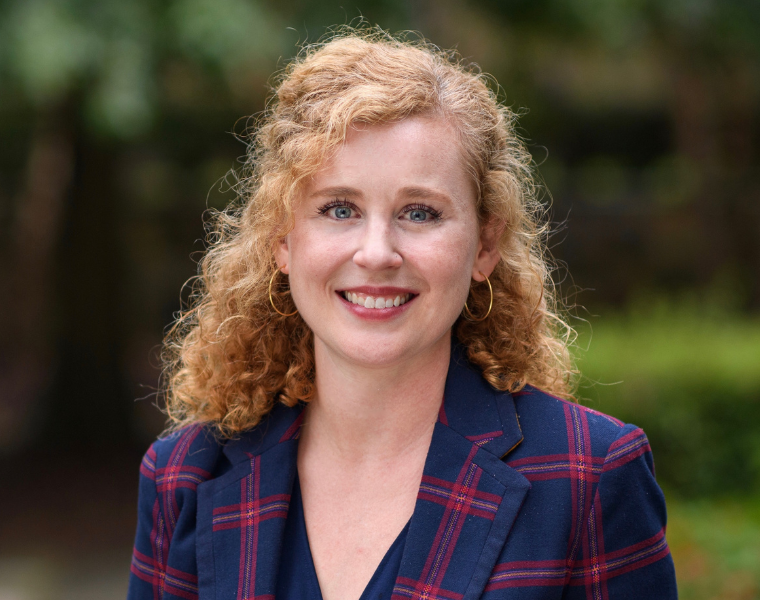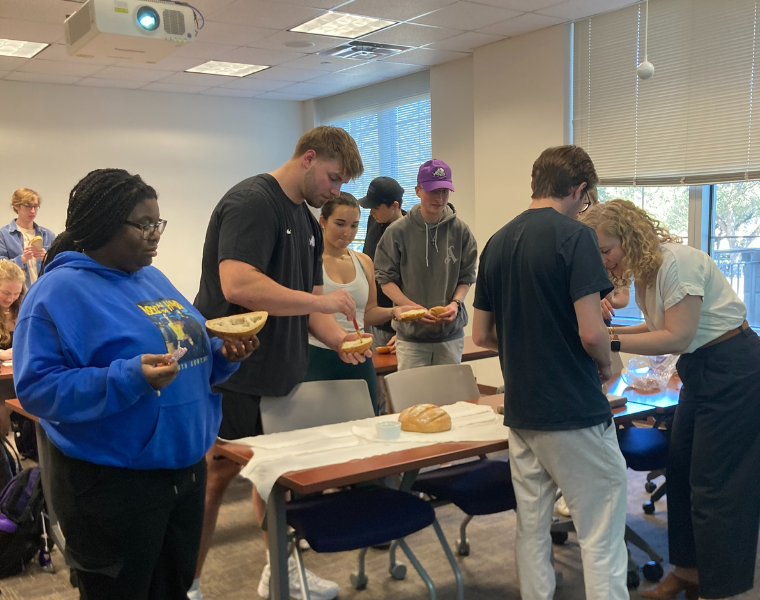Even though most of us feel like we’re in an information age far from our early predecessors, Melissa Reynolds says, “We’re not so different.” The assistant professor of history explores how readers hundreds of years ago grappled with the same challenges we face today — sorting truth from misinformation and trying to make sense of an ever-expanding world of information. Her book, “Reading Practice: The Pursuit of Knowledge in Early Modern England,” was recently recognized with the Snow Prize from the North American Conference on British Studies. She shares how her research offers insight into both the past and the present and how those discoveries inspire her teaching at TCU.

Congratulations on winning the Snow Prize! What does this recognition mean to you and your work?
Thank you so much. To have my book recognized by other scholars within my field is meaningful because academic books are like conversations with other scholars. You cite their books and build from their ideas, and though you conduct your own research in archives and libraries, it’s the voices of other scholars that shape the questions you ask and the words you put on the page. Many of the books that have been awarded the Snow Prize over the last several decades were foundational to my own training as a historian, so to be included on that list is really an honor.
What inspired you to write Reading Practice, and what surprised you most during your research?
As is the case for most first books written by academics, “Reading Practice” began as my dissertation. Over several years of research, I viewed hundreds of medieval manuscripts and early printed books containing useful, practical information like medical recipes, weather forecasts, instructions for gardening, fishing or sewing and lists of herbal remedies. I focused on these books because I believed them to be especially important for understanding how people perceived their ability to access and interpret knowledge.
Over 500 years ago, people had the same desire to understand their symptoms or query simple how-to questions as we do. They turned to these “practical books” instead of YouTube or Google, but they had the same problems making sense of the information at their fingertips. Which recipe was best? What was most effective? What could be trusted?
I think what surprised me most about this research was the significance of medicine and practical science in the lives of people living so long ago, before modern biomedicine or the contemporary scientific method. Most of the medical recipes and weather forecasts that they collected in their practical books are clearly ineffective by the standards of modern medicine and science, but these people kept looking for better and more useful information as a means of making sense of their lives. We’re not so different.
Your book shows English readers learning to think critically about knowledge. Do you see any parallels with how people approach information today?
The years I spent revising my dissertation into the book that would become “Reading Practice” were the same years we all suffered through the COVID-19 pandemic. Though I wouldn’t want to repeat that experience, I did find that I could better understand the anxiety and uncertainty premodern people felt about their health because of the pandemic. I could also see parallels between the medical salesmanship and misinformation of the early modern era and similar trends on social media today, which was a totally new way of thinking about my work!
You teach courses like History of Science and Technologies of History. How does your research shape your teaching?

My research focuses on people living more than 500 years ago, who we don’t typically think of as “scientists,” but who nevertheless thought a lot about topics we tend to associate with the history of science. When I teach about the history of science in this period, a period typically associated with the “Scientific Revolution,” I really try to bring in the perspectives of these “ordinary” people. So, as an example, I might lecture about the famous astronomer Nicolaus Copernicus, who was the first to theorize that the earth revolved around the sun and not vice versa, but then instead of reading Copernicus’s book (which was written in Latin and intended for other very educated astronomers). I have students read excerpts from a popular almanac that presented Copernicus’s ideas, which is how the average reader in Tudor England would have first encountered the revolutionary argument that the earth was not, in fact, the center of the universe.
My book also really emphasizes how changes in media, going from a manuscript culture to a print culture, affected people’s attitudes toward knowledge. That’s the broad focus of my Technologies of History class, which explores how communication technologies, like the invention of writing or the invention of print, had big impacts on the course of history. But I also designed the course to teach students new digital skills, like network analysis or geospatial analysis, which are transforming how historians (myself included) approach their sources and write history.
What’s next for your research? Is there a new topic or project that’s captured your curiosity?
I’m in the early stages of researching a second book on medicine and the environment in the early modern Atlantic world, which is exciting. I spent a month this past summer at the Folger Shakespeare Library in Washington, D.C., on a short-term research fellowship. While there, I created a big database of letters from 16th-century merchants responsible for importing cutting-edge pharmaceuticals 500 years ago. There were pirates! And trade deals! And conflicting national interests over access to these new medicines from far away! It’s been fun to dive into this new project, and I’m excited to see where it goes.